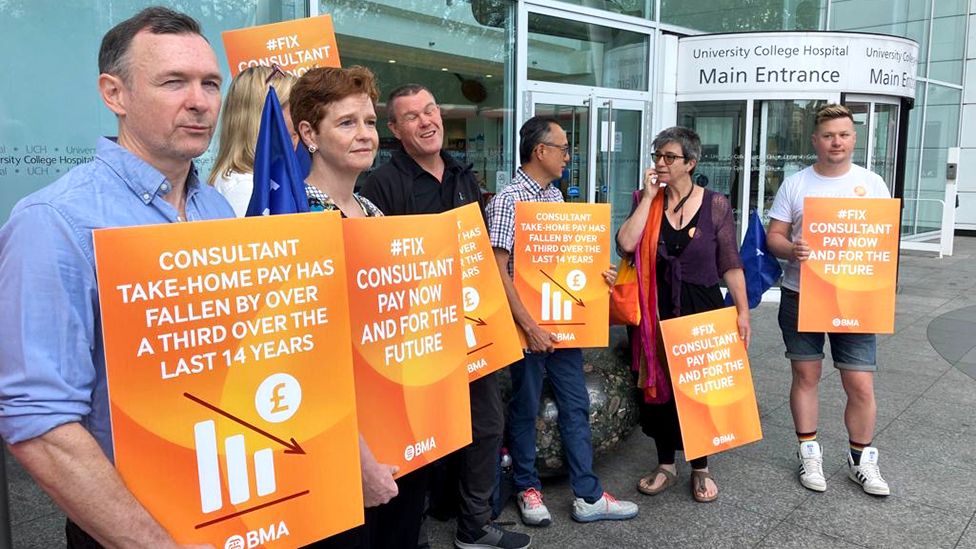ARTICLE AD BOX

By Nick Triggle
Health correspondent
Senior hospital doctors are taking part in their second strike of the year in England in a dispute over pay.
The two-day walkout begins at 07:00 BST with NHS bosses warning patients to expect significant disruption.
But as the strike begins, an analysis by the Nuffield Trust has shed fresh light on their pay levels.
It has found while salaries have not kept up with inflation, NHS senior doctors are still earning more than counterparts in a number of countries.
The analysis, which takes into account the cost of living in different countries, placed them above those in France, Spain and Italy as well as New Zealand.
But their pay was a little behind Germany, Ireland and the Netherlands.
Data was not available for either Australia or the US, which the think tank said limited the conclusions that could be drawn.
But they said the findings provided useful context in the ongoing debate about doctors' pay.
However, the BMA called it "unhelpful", saying pay was higher because of the amount of extra work NHS doctors were having to do.
Meanwhile, NHS England warned patients to expect major disruption during the two-day walkout.
Consultants will only provide Christmas Day cover, meaning that while emergency care will be provided, almost all routine care will come to a standstill.
"This latest action will again hit the NHS hard," said NHS England's Dr Vin Diwakar.
Patients who have appointments are being urged to attend though, unless they have been told otherwise.
GP services are not affected.
What are consultants paid?
Consultants have been given a 6% pay rise by the government this year - as recommended by the independent pay review body.
It brings their basic salary to between £93,00 and £126,000 depending on experience.
But consultants also earn extra - about a quarter more - for things such as being on-call, additional hours and bonuses.
The analysis by the Nuffield Trust shows this pay - before any money made from private work - puts them in the top 2% of earners despite the years of below-inflation wage rises.
The British Medical Association says consultant pay has fallen by 35% since 2008 - but this is take-home pay once tax is taken off.
Tax policies over the past decade have meant higher earners pay more.
If total pay is used, the cut is smaller.
But the Nuffield Trust said this did not take into account the "upside" of above-inflation rises seen before then, pointing out that from the early 1990s doctors had enjoyed a decade or so of more generous pay rises.
The Nuffield Trust said it hoped the analysis would lead to a better-informed debate and that it was also important to remember pay was not the only factor behind the dispute, as issues affecting staff retention and wellbeing were also crucial.
What is happening next in dispute?
BMA consultants committee chairman Dr Vishal Sharma urged ministers to get round the negotiating table.
"No consultant wants to be striking, so we head out to picket lines with heavy hearts."
The BMA wants to see above-inflation pay rises to start to rectify the cuts seen over the past 15 years.
After this strike, there is a two-day walkout planned in September, and the union has now announced a three-day strike at the start of October.
But the government has said the pay award is final and there will be no more talks.
Health Secretary Steve Barclay said he was "concerned and disappointed" by the continuing strike action.
Junior doctors have been taking part in strike action since spring. The mandate expired this month, but the result of a fresh ballot is expected before the end of the month.
England is the only part of the UK where consultants are taking strike action. In Wales, the BMA is preparing to formally ballot members, while in Scotland, they are consulting with them.

 1 year ago
74
1 year ago
74








 English (US) ·
English (US) ·